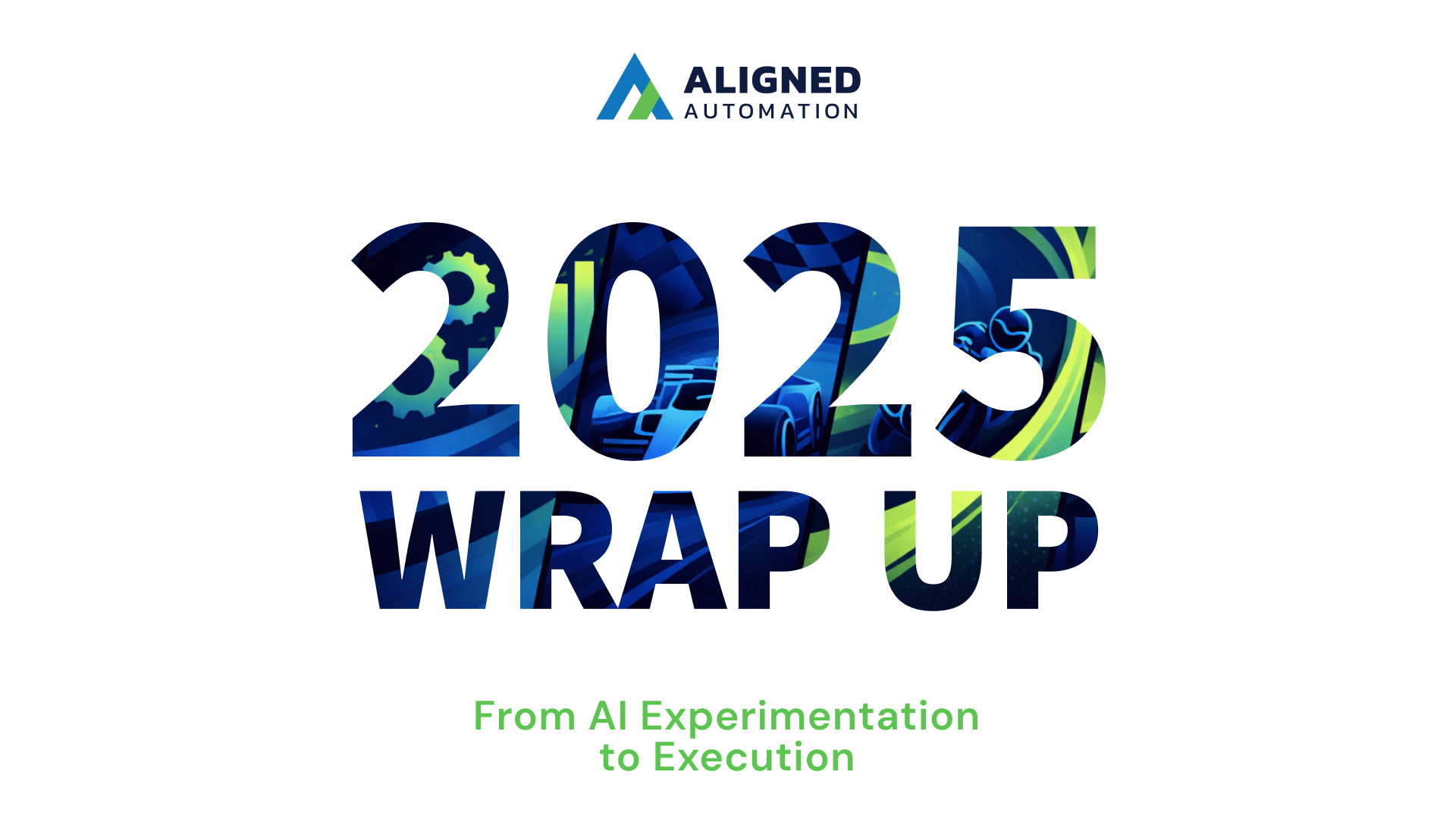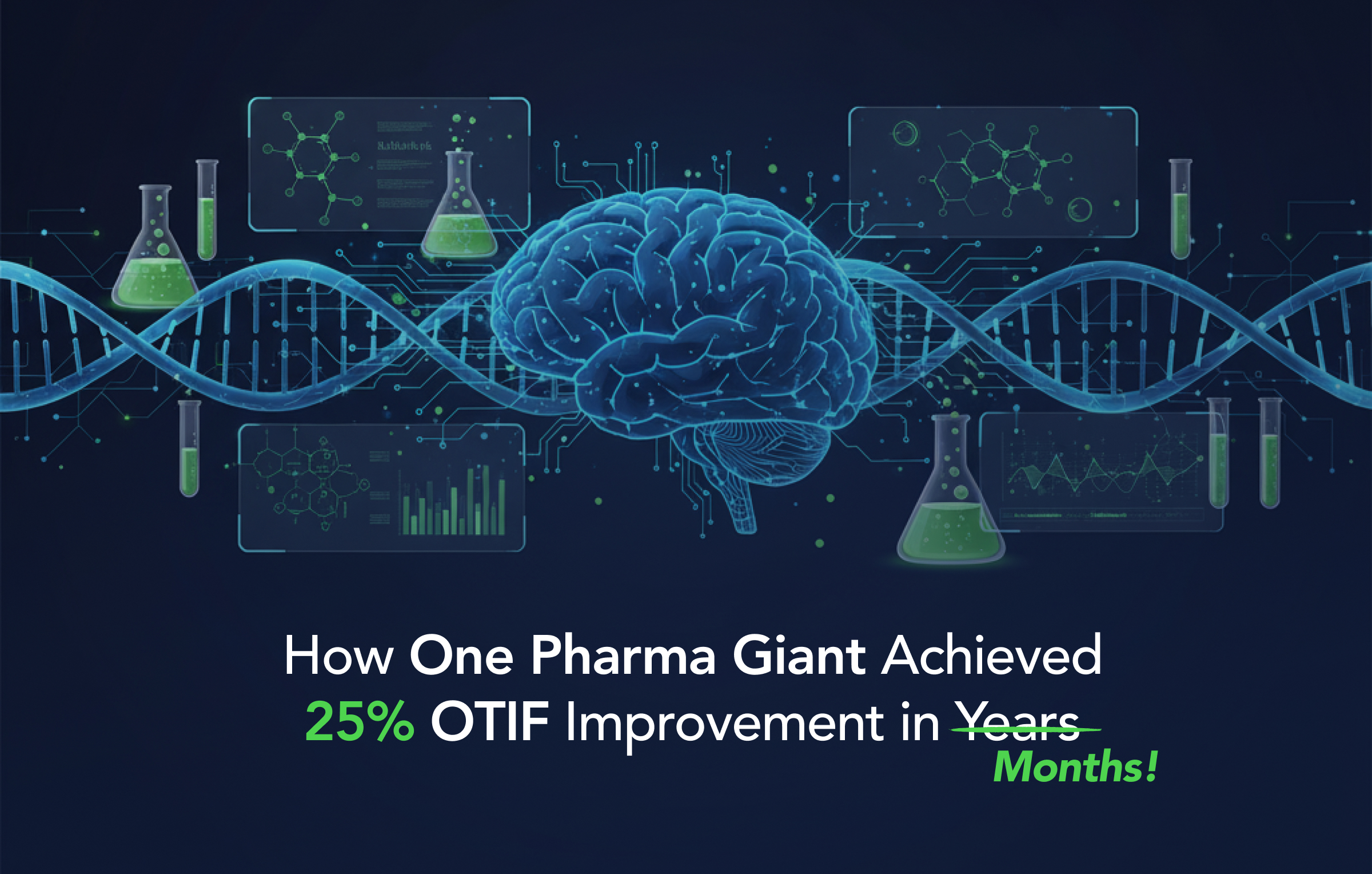

The pharmaceutical industry is undergoing a major transformation, driven by the rise of artificial intelligence (AI).
AI is expected to generate between $60 billion and $110 billion in annual economic value for the pharma and medical-product sectors. This impact comes largely from AI’s ability to boost productivity, speeding up drug discovery, accelerating development and regulatory approvals, and enhancing how products are marketed. As a result, AI is reshaping operations across sales, supply chain, and manufacturing.
At the same time, recent tariff changes introduced by the U.S. government are adding urgency. Pharma companies are under pressure to adapt quickly, and AI is becoming essential for forecasting demand, managing resources efficiently, and staying ahead of the competition.
To delve deeper into AI’s impact on the pharmaceutical landscape and explore how our own AI-powered solutions can support this journey, our team at Aligned Automation attended Pharma USA 2025 in Philadelphia.
This two-day event brought together leaders from pharma, healthcare, and tech to focus on the commercial and medical affairs side of the industry.

Here’s what we took away from the conversations at the event:
1. From Pilots to Scalable Frameworks: Driving Commercial Transformation with GenAI & Agentic AI
One of the event’s standout themes was the shift from AI experimentation to full‑scale deployment across commercial functions, especially sales, marketing, and HCP engagement.
Speakers stressed that success hinges on strong change management and clear expectation‑setting when layering AI onto legacy systems.
To support this, organizations need standardized frameworks for evaluating, scaling, and governing AI globally. The goal is to pinpoint “low‑hanging fruit” in the pharma value chain, projects that deliver quick wins, measurable ROI, and build momentum for broader adoption.
AI shouldn’t be pursued as a novelty but as a strategic advantage: personalizing treatment plans, predicting disease progression, or mining complex datasets to improve diagnostics and patient communication.
We also saw growing interest in structured approaches to assess readiness, quantify business value, ensure ethical and regulatory compliance, and integrate AI into existing tech stacks.
Some key observations from this conversation included:
- Over 60% of pharma executives reported that GenAI is already being tested in commercial functions such as marketing personalization, field force enablement, and customer segmentation.
- GenAI is automating content creation, aligning messaging, and personalizing outreach based on real‑time HCP behavior and preferences.
- Agentic AI, autonomous systems that can plan, act, and adapt, is being explored to automate repetitive tasks like CRM data entry, customer‑response workflows, and territory planning.
These insights mirror the roadmap in our guide, “AI Imperative,” which outlines a phased approach, from experimentation and optimization to full‑scale integration. If you haven’t explored it yet, you can read it here.
2. Medical Affairs and the Power of Data-Driven Decision Making: Accelerating Market Research and Clinical Innovation
At Pharma USA 2025, a standout discussion showed how AI is transforming Pharma Medical Teams from data-drag to data-driven decision-making. The speaker began by contrasting the old way of manual data wrangling, slow insights, and siloed information with today’s AI-powered workflows that continuously evolve from pilot projects to fully integrated systems.
AI’s impact is most notable in how teams handle vast amounts of scientific and patient data. Key applications include:
- Scaling data analysis: AI platforms mine scientific papers, clinical-studies results, and patient records to surface actionable insights in minutes rather than weeks.
- KOL identification: NLP models scan the literature to map out key opinion leaders and their influence networks.
- Automating medical inquiries: Virtual assistants address routine HCP questions, freeing medical liaisons to focus on strategic engagements.
- Real‑time data synthesis: Dashboards aggregate and summarize new findings, ensuring every team member stays current.
One group shared that by using an AI engine to structure unstructured conference and publication data, they cut their time‑to‑insight by 45%.
The conversation then turned to R&D and market research, where data fragmentation remains a barrier.
What we heard on the ground:
R&D is so difficult because across phases, departments, and hospital systems, the data lives everywhere, people’s heads, emails, paper records, disconnected platforms. It’s nearly impossible to build a cohesive picture.
This reflects a deeper challenge facing many pharma teams. They do not lack ambition, they lack a starting point. The sheer number of specialized tools across the value chain, from packaging systems to component-level inventory software, leads to hundreds or even thousands of disconnected data sources. Terabytes of information must flow between systems, but there is no common infrastructure or architecture to support that. Many organizations are simply overwhelmed.
A prime example discussed at the conference was the creation of a global, centralized repository for cancer drug trial data, giving researchers everywhere a single, real-time source of truth. With deeper insights into physician behavior and site performance, teams can increase trial participation, accelerate study timelines, and deploy AI-driven analytics for on-the-fly decision-making.
In oncology development, AI is also being used to:
- Merge trial data across all phases
- Unify datasets from diverse geographies and study sites
- Predict patient dropouts and forecast site performance with machine learning
By breaking down data silos, these AI applications not only shorten research cycles but also improve physician targeting and boost recruitment. They ultimately drive smarter business investment choices and greater business agility.
Where Aligned Automation Comes in
At Aligned Automation, we bring direct experience supporting leading pharmaceutical companies, including partnerships with innovators such as Eli Lilly. Our work spans unifying fragmented data ecosystems, modernizing legacy systems, and building scalable AI infrastructures that accelerate insight generation across clinical and commercial operations.
We also draw on deep expertise from other complex, highly regulated industries such as high-tech manufacturing, healthcare, and energy. These sectors face similar challenges, including siloed data, strict compliance demands, and the need for real-time decision-making at scale. We apply these proven best practices to pharma environments to deliver measurable results.
Scaling AI in pharma demands more than technology expertise. It requires navigating regulatory complexity, orchestrating fragmented data, and delivering practical, scalable solutions. That is where Aligned Automation excels. - Aligned Automation
Our approach helps pharma organizations move confidently from proof of concept to enterprise-wide impact, minimizing operational disruption and maximizing business value.
3. GenAI for Personalized Patient Care
A recent case study showed how an GenAI-powered virtual assistant increased medication adherence by 18% among chronic care patients.
As healthcare shifts toward value-based care, GenAI is playing a critical role in improving patient outcomes.
Some specific outcomes discussed during the event were:
- Predictive modeling for disease progression and relapse
- AI-guided diagnostic tools for faster and more accurate assessments
- Tailored treatment plans using patient history, genomic data, and real-time health data
- Enhanced digital engagement platforms to support treatment adherence and communication
4. Ethics, Privacy, and Responsible AI
Though regulatory hurdles persist, particularly due to fragmented policies across the US, EU, and APAC regions, the push for cohesive global AI governance frameworks emerged as another central theme of the event.
Ethics, privacy, and transparency anchored debates around AI adoption, with critical concerns focusing on:
- Algorithmic bias in patient-facing healthcare models, which risked perpetuating inequitable outcomes;
- Inadequate consent mechanisms that governed the use of sensitive patient data;
- Security vulnerabilities in interconnected healthcare systems, which amplified exposure to breaches.
These challenges underscored a universal takeaway: advancing AI innovation required equally rigorous safeguards to uphold accountability and public trust.
From Systems Integration to Agent Deployment
To close out, the conference offered hands‑on guidance for embedding AI agents into existing pharma infrastructures.
Speakers underscored three essentials:
- Modular architectures that easily accommodate AI plug‑ins
- APIs designed for safe, transparent, and explainable function calls
- Team enablement, training commercial and medical staff to collaborate seamlessly with AI agents
By focusing on these practical steps, GenAI and Agentic AI move beyond proof‑of‑concepts to become core components of the pharma operating model.
Today, the industry’s challenge isn’t whether to adopt AI but how quickly and comprehensively to scale it. From commercial strategy and medical affairs to market research and patient care, AI is unlocking new efficiencies, driving innovation, and delivering results that matter.
AI isn’t just a tool for pharma’s future; it’s the foundation.
The question now isn’t ‘Can we afford to invest in AI?’ but ‘Can we afford not to?’ The answer will define the next era of medicine.
Ready to scale AI across your pharma operations?
Aligned Automation partners with leading pharmaceutical companies to turn AI ambition into measurable business outcomes.
Transform Your Ideas into Powerful Digital Solutions

























.svg)




















